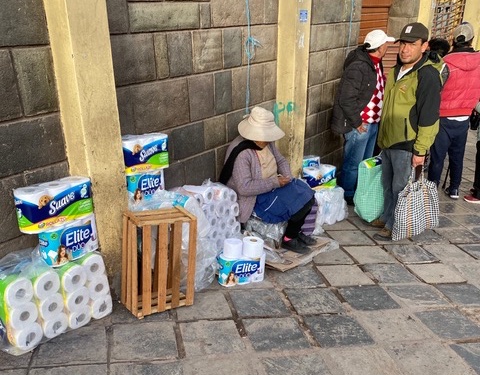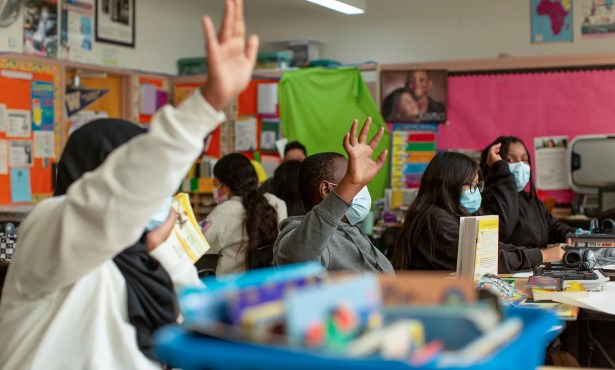Coronavirus Travel Ban Traps Santa Barbara Couple in Peru
Realtor Michelle Cook Says U.S. Embassy and State Department Have Offered Zero Help

As nations across the globe shut their borders in an attempt to battle the coronavirus pandemic, a number of Central Coast residents find themselves trapped in places as far flung as India, Morocco, and Egypt.
Michelle Cook, a Santa Barbara–based Realtor, and her husband, Mark, are stranded in Peru. Along with a few dozen other Americans, they’re currently locked down in a hotel in Cusco, not allowed to leave except for medication or food, and even then only one at a time. Military personnel roam the empty streets checking passports and denying passage at their discretion.
The hotel is comfortable, Cook said, but some of the unwilling guests are struggling with serious unmet needs. One man has an abscessed tooth. He hasn’t been permitted to see a doctor, and none will come visit him. One woman is very pregnant and asking for late-term medical care. Another is running out of baby formula. A man who just started a company back home is terrified he’s already out of business.
Other guests’ issues aren’t as critical but are still disrupting their lives. A pair training for a marathon are running lap after lap after lap around a central courtyard. A set of parents with three hyperactive kids are quickly losing their nerve. “They’re going absolutely bonkers,” Cook said.
Cook’s trip was supposed to be a two-week birthday adventure that started in Peru’s Sacred Valley, home to Machu Picchu and other sites of Inca Empire history. But after just a couple of days, their phone rang in the middle of the night. Their tour guide explained that President Martín Vizcarra had issued a 15-day state of emergency and that Peru’s borders would close the next day. They had to leave immediately.

Cook and her husband packed their bags and gathered in the lobby with other travelers. They did their best to book a commercial flight from Cusco, a two-hour car ride away, but had no luck. One family tried to charter a plane, but it was going to cost $180,000 for 13 seats, far above the group’s budget. Another guide warned they should still leave for the city because the lockdown was likely to cause a shortage of food and supplies in the remote region, and looters would then descend from the hills.
Now nearly a week in Cusco, Cook still hasn’t received an ounce of support or guidance from Peru’s U.S. Embassy, which she registered with before the trip. “It’s actually been a joke,” she fumed. “They don’t answer any calls. Nothing.” Though the quarantine is supposed to lift March 30, there’s a chance it could continue for another 15 days, officials have said. “That’s really concerning,” said Cook. She’s since reached out to the offices of Rep. Salud Carbajal and Sen. Hannah-Beth Jackson for help.
Other Americans in other closed countries are reporting similar frustration with inaction from their embassies and the U.S. State Department, which has struggled with serious staffing shortages since a hiring freeze was instituted by former Secretary of State Rex Tillerson. A group of nine U.S. senators wrote to current Secretary Mike Pompeo this Wednesday to say, “Americans in Honduras, Morocco, Peru, and Tunisia, among other countries, have reported to our offices that they are encountering difficulties in obtaining support from U.S. Embassies and Consulates, including to arrange commercial flights home. In some cases, they are reporting that they are unable to establish contact with, or receive even basic information from, U.S. Embassy personnel.”

The senators said they wanted “immediate clarification” about Pompeo’s plans to get Americans home, “whether by commercial airline flights, charter flights, or other means.” A State Department spokesperson responded, “We are aware the governments of several countries have announced suspension of air travel. We are considering all options to assist U.S. citizens in these countries.”
In the meantime, Cook and the others marooned in Peru have banded together through WhatsApp to commiserate and share information. She said she’s using the opportunity to work remotely, take online courses, organize her digital photos, and practice yoga. “I’m finally learning to stand on my head,” she said.
She and her husband are among the least stressed by the situation, Cook said, and would insist on others leaving before them, once it becomes possible to do so. “We’re putting ourselves at the back of the line,” she said, “because a lot of these people are in really tough spots. We just want to help them get some attention.”



You must be logged in to post a comment.